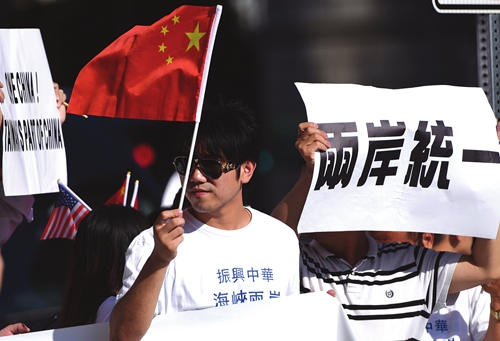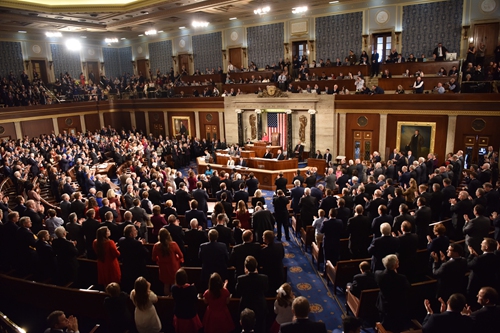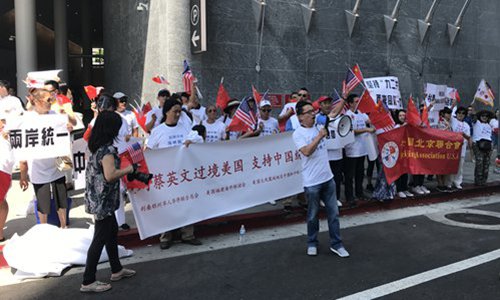Taiwan separatist lobby try hijacking US policy
By Yang Sheng Source:Global Times Published: 2020/5/18 19:39:39

A Chinese community in Los Angeles calls for reunification and protests Taiwan leader Tsai Ing-wen making a stopover in the US in August 2018. Photo: cnsphoto
Since the US identified China as its major strategic competitor, separatists of Taiwan island have been taking advantage of the widening rifts to influence US foreign policy. The Taiwan lobby aims to shake the foundation of the China-US relationship and has renewed sway among US politicians in the White House and Congress.
The separatist Democratic Progressive Party (DPP) of Taiwan has seemingly gained achievements in recent years.
US Congress has passed legislation encouraging Taiwan separatism and provoking China's sovereignty. The Taiwan Travel Act, signed by the Trump administration in 2018, allows leaders of Taiwan to travel to the US as all but diplomatic representatives. Passed in March, The Taiwan Allies International Protection and Enhancement Initiative (TAIPEI) Act calls on international organizations to increase the island's so-called diplomatic scope.
Most recently, the White House has made efforts to politicize the World Health Assembly (WHA) by encouraging its allies to support Taiwan to join the assembly without respecting the one-China principle.
The DPP and pro-Taiwan independence US politicians might believe they have created many troubles for the Chinese mainland with little cost, and they can even earn benefits from each other without significant punishment from China, but in fact, they are endangering the peace of the West Pacific region experts warned.
When China realizes the US completely changed its promise to respect the one-China principle, as well as abandoned its official neutrality on Taiwan affairs, the mainland would probably decide peaceful reunification is unlikely to realize. The mainland will be forced to prepare non-peaceful measure, and at that time, Taiwan separatists and US warmongers will lose, said mainland analysts.
Influencing US foreign policy
Taiwan lobbying in the US can be traced back to the World War II. The Kuomintang regime at the time sent delegations to lobby the US asking for support in the War of Resistance against Japanese Aggression, and after 1949 when the KMT lost the civil war and retreated to Taiwan, the island's authority also lobbied the US to build a "joint defense alliance" against the mainland.
When the US established formal diplomatic ties with the People's Republic of China in 1979, Taiwan had used its lobby groups to ensure the US passed the Taiwan Relations Act to maintain some connections between the island and the US under table, including arm sales.
The bipartisan Congressional Taiwan Caucus is the second largest Congressional Member Organization in the United States Congress with 139 members. The caucus focuses exclusively on improving US ties with the island. Chinese mainland analysts noted that apart from Israeli lobby groups, advocacy groups from Taiwan are likely the ones that spent the most money influencing US foreign policy.
Yuan Zheng, a research fellow and expert on Taiwan lobbying activities in the US at the Chinese Academy of Social Sciences, told the Global Times "Taiwan has paid a lot of efforts to maintain its ties with US congressional members by inviting them to travel to the island and also building personal relations with their families."
Especially with the conservative Republicans with anti-Communist mentality, the island has found common ideological ground with them. After the island kicked off Western neoliberal democratic reform in the 1980s, the Democrats also found they have political values in common, so even though Taiwan politicians provided material benefits to influence US foreign policy, they would not be criticized in US public opinion due to ideological reasons, Yuan said.

US Congress Photos: cnsphoto
In the US, the Chinese mainland doesn't have such capacity to influence Congress even though it has more money than Taiwan and is more powerful. Due to ideological difference, it would be a "political suicide" if any US politician dares to help the mainland, even if it could benefit both sides, Yuan added.
The two major political parties of the island all have their own lobby groups in the US. The KMT has held a pro-reunification stance and had deeper connection with the US. The separatist DPP was not considered as trustworthy as the KMT in the 2000s, US worried the DPP's extreme separatism held by the island's then-leader Chen Shui-bian would send the US to unnecessary frictions with the Chinese mainland.
"The time has changed. At that time, the Bush administration needed China's support to its Global War on Terror, as the biggest enemy to the US at that time was terrorists, so it will surely try its best to make sure China-US ties were stable and suppress separatists of the island," Yuan said.
In 2016, according to CNN, the DPP officials hired US senator-turned-lobbyist Bob Dole to set up a controversial phone call between then president-elect Donald Trump and Taiwan regional leader Tsai Ing-wen, marking a shift in the US attitude toward cross-Straits relations.
"I've never met a member of Congress who says 'I don't support Taiwan issues,'" said Coen Blaauw, executive director of the Washington-based Taiwan advocacy group Formosan Association for Public Relations, the VOA reported on March 27, 2019 in a report about the Taiwan advocacy groups influencing the quick rising ties between the US and the island.
Yuan said although the DPP and the KMT have sponsored and run different lobby groups in the US, they now share common interests, and due to the fact that they have deep ties with local Chinese Americans, they can even help the local US politicians, including senators, run for election.
"For instance, Global Taiwan Institute, a new lobby group backed by the DPP, was sponsored by local Chinese American businessmen," and they can make Chinese Americans vote, and provide political contribution to US politicians for local elections, so they share a lot of common interests, Yuan said.
Money and politics
The power comparison between the two sides of the Taiwan Straits has totally lost balance as the mainland has overwhelming advantage in economy, military, politics and technology, so the US believes that if it just maintains its previous policy, the mainland will soon reunify with Taiwan and Washington will lose its most important card that could effectively provoke and contain the Chinese mainland, said an anonymous Taiwan-based military observer.
"So the politicians in both the US and the island will have more excuses and legitimacy to boost arms sales and they can earn more profits from the business," he noted.
Li Xiaobing, a Taiwan studies expert at Nankai University in Tianjin, said that in fact, the most important reason for Taiwan to influence the US foreign policy is the island's status, which is a key matter the US can exploit to contain the Chinese mainland, and that Taiwan is a major client to US military industrial companies and is willing to spend high prices to buy outdated weapons. "So the interests are always entangled with corruption under the table."

Chinese demonstrators sing songs and chant slogans while waiting for the arrival of Taiwan leader Tsai Ing-wen in Los Angeles in August 2018. As Tsai arrived at the Intercontinental Hotel, she was greeted by peaceful Chinese demonstrators of all ages and from all walks of life. They were holding flags, banners and signs bearing the slogan "One China." The crowd began chanting "One China!" and "Oppose Taiwan Independence!" as Tsai pulled into the hotel. Photo: Wang Rujun
The US-based Project 2049 Institute is one of the organizations that frequently receive "donations" from Taiwan authorities, the Global Times found. Ian Easton, a research fellow from the institute, published an article in March advocating that "America should put military forces in Taiwan" in return for Taiwan island's long-term funding and to cater to the rise of US containment of the Chinese mainland.
The Taiwan representative office in the US in 2016 gave the institute $150,000 in funding, while the Taiwan "defense department" also donated about $130,000. Additionally, the Prospect Foundation, a think tank in Taiwan focused on security, donated $60,000-70,000 to the Project 2049 Institute.
Dangerous moves
If Taiwan lobby groups and US politicians keep moving in this direction, the possibility of a peaceful reunification by the mainland will decline sharply, and this is truly dangerous for them, Li said.
Lü Xiang, a research fellow on US studies at the Chinese Academy of Social Sciences in Beijing, said that the US has no capability to protect Taiwan once the separatists cross the red line, since the mainland now has the overwhelming military advantage to solve this long-standing problem, therefore "the more tricks they play to challenge our principle, the nearer we get to reunification."
However, the DPP and other separatists of the island don't really believe the mainland dares to solve the Taiwan question by force as they believe the mainland is preoccupied by other problems, Yuan said.
"They might push something like an illegal 'independence referendum' to challenge the Chinese mainland's bottom line, and if the US made no effort to suppress these dangerous attempts, the mainland might have no choice but to respond with ultimate measures," said Jin Canrong, associate dean of Renmin University of China's School of International Studies in Beijing.
Posted in: IN-DEPTH